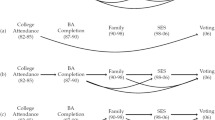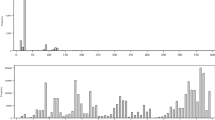Conclusion
This paper reports on the use of laboratory experiments to identify the effect of information on voting behavior and electoral outcomes in the direct legislation environment. I showed that when incompletely informed voters know that the setter has paid a certain amount to contest an election, they can use this information to increase the likelihood that they cast the same votes they would have cast had they possessed complete information. As a consequence of the way voter strategies were affected by information, the likelihood that the “incomplete information” electoral outcome was the same as the electoral outcome that would have been chosen by a completely informed electorate increases, as does the responsiveness of direct legislation outcomes to “complete information” voter preferences.
While this research does not resolve long standing questions about the responsiveness of democratic institutions, it does add to what we understand about responsiveness by demonstrating conditions under which incompletely informed voters can generate the electoral outcomes that they would have if better informed. This research also informs the debate about the use of the referendum and initiative to determine policy. My answer to the question: “Is direct legislation is a useful mechanism for obtaining policy outcomes that correspond to the “will of the majority” or is it a way for small, wealthy interest groups to subvert the “popular will,”” is that direct legislation can be both. When voters are badly informed (or the electoral alternatives are reasonably complex), and there are no effective information cues available, small groups who have enough resources to obtain agenda control can use direct legislation to obtain preferred outcomes. When meaningful cues are available (or the effect of electoral alternatives are easy to understand), then direct legislation can be useful tool for the implementation of majority-preferred policies.
Similar content being viewed by others
References
Collier, K.E., McKelvey, R.D., Ordeshook, P.C. and Williams, K.C. (1987). Retrospective voting: An experimental study.Public Choice 53: 101–130.
Herzberg, R. and Wilson, R. (1990, March). Voting as a public bad: Theoretical and experimental results on voting costs. Mimeo, presented at the Western Political Science Association Meetings.
Kreps, D.M. and Wilson, R. (1982). Sequential equilibria.Econometrica 50: 863–894.
Lupia, A, (1994). Short cuts versus endorsements: Information and voting behavior in California insurance reform elections.American Political Science Review, Forthcoming.
Lupia, A. (1992). Busy voters, agenda control and the power of information.American Political Science Review 86: 390–403.
McKelvey, R.D. and Ordeshook, P.C. (1984). Rational expectations in electons: Some experimental results based on a multidimensional model.Public Choice 44: 61–102.
McKelvey, R.D. and Ordeshook, P.C. (1985). Sequential elections with limited information.American Journal of Political Science 29: 480–512.
Romer, T. and Rosenthal, H. (1978). Political resource allocation, controlled agendas, and the status quo.Public Choice 33: 27–44.
Romer, T. and Rosenthal, H. (1979). The elusive median voter.Journal of Public Economics 7: 143–170.
Author information
Authors and Affiliations
Additional information
I thank Richard McKelvey and Peter Ordeshook for continuous support and advice and Leopold Travis for programming assistance. Comments made by Rick Wilson, Tom Palfrey and Randy Calvert were also very helpful. Funding for this project was provided by the National Science Foundation and the Division of Humanities and Social Sciences at the California Institute of Technology.
Rights and permissions
About this article
Cite this article
Lupia, A. The effect of information on voting behavior and electoral outcomes: An experimental study of direct legislation. Public Choice 78, 65–86 (1994). https://doi.org/10.1007/BF01053366
Issue Date:
DOI: https://doi.org/10.1007/BF01053366




